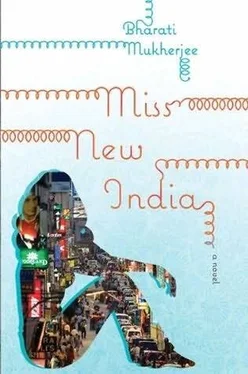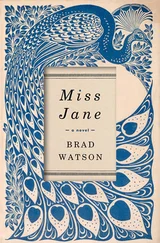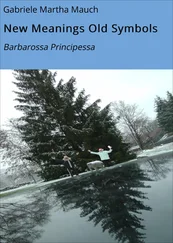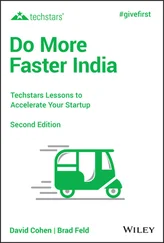Shaky Sengupta called, "Restore mountain, please. No talking with subject."
"A godlike mission, restoring mountains. See you after," the boy said, pressing one long finger against his lips. "My name is Rabi Chatterjee." He squeezed the tips of her fingers. His hand was cold. "I'm a photographer too. Only different."
Chatterjee? A Brahmin, so marriage to a Bose was effectively out the window. She thought she knew all the Bengali families in Gauripur, especially those with interesting boys, even the Brahmins who these days couldn't always be choosy. She'd seen the ads, "Caste no bar," especially for the poor, less attractive, and less educated Brahmin boys or girls.
AFTER SHE CHANGED back to her jeans and T-shirt for the short walk home, Rabi was waiting. "Let the fun begin," he said. Before she could pose, there in the chaos of lights and reflectors and cables and halfrolled-up props, he took out a small silver digital camera and shot her, again and again. He promised her that the girl in his pictures was destined for a different fate than marriage, quite the opposite of Shaky Sengupta's girl with a dimple, in uncreased silk.
When they were walking along LBS Road past Pinky Mahal, he asked if she was really serious about finding a boy. He was the first boy her own age she'd ever walked with in public, alone, not in a student group. And probably the last. She answered hesitantly, wondering, as was her custom, if he was offering himself. He spoke so rapidly that his English sounded like a foreign language in a different cadence. She felt herself growing breathless, just trying to keep up.
"It's for my parents," she said.
He stopped, turned, and stared. "You're getting married for your parents? That's crazy."
"Other people have said the same thing." Of course, that one other person was American. She could get interested in a boy like Rabi, all energy and enthusiasm, with a quick mind, long fingers, and startling English. "You know how it works. I don't have a say in it." Then she wondered, Did he know how India worked? Despite his name and looks, he seemed more foreign than Peter Champion.
"India's on fire. If you get married now, you'll miss what's happening and you'll be sorry."
Gauripur, on fire? Peter used to say that, and it still seemed funny. "Bangalore and Mumbai might be on fire, but Gauripur is still in the deep freeze." Then, on a perkier note, "I thought I knew all the Bangla families in Gauripur. So where have you been?" Where have you been hiding? Why haven't you come forward and answered any of the ads? If she had to guess, he was one of those boys from boarding school, from Dehra Dun or Darjeeling, an Indian boy with international connections. Or maybe his parents were diplomats and he'd been raised overseas and gone to American schools.
"I've been in California all of my life."
She laughed. "Now that's crazy. Why would anyone from California come to a pokey little town like Gauripur? This is a prison!" She'd slipped into Bangla, just to slow things down. She was a little afraid of making a mistake in his rapid-fire American. His even-shakier Bangla fired her confidence. His long, skinny legs ate up the footpath; she had to run to keep up.
"You ask what I'm doing here? I'm having fun. When you're taking pictures, every place is interesting… every face is beautiful… every day's incredible and every night's an adventure… When you're looking through a camera, Gauripur's amazing. When I put my eye to the viewfinder, everything changes. I only see things, really see them, when I'm looking through the camera. They rave about painterly light in southern France… Ha! It's feeble compared to India. What is that thing called-Pinky Mahal? Just look at it! It's magnificent! Better than the Taj! It's your own Rouen cathedral. Monet would go crazy for it."
Normally she would have nodded and smiled, afraid to show her ignorance. But she trusted the boy; he wouldn't laugh at her. He was the first person, with the slight exception of Peter Champion, who after all was still a teacher and her superior, to understand, even blunder into, her nascent yearning to be respected. "Moray?" she asked. "That's a fish." A fish painted a ruined cathedral?
"Claude Mo-nay, M-O-N-E-T, the father of impressionism." His tone was offhand, conversational, as though Claude Monet and his weird cathedral in a town in France were the subject of everyone's light-hearted conversation. "I'd call him the father of photography too. He painted the Rouen cathedral at various times of the day, just to show the effect of different angles of light."
Angles of light! And he's only my age! she thought.
The pace of his speech was picking up. "Monet changed everything. He ended the tyranny of the subject. The medium became the subject, and the medium was light." Faster, faster.
Slow down, please, she thought. I can't follow-you speak too fast. Tyranny of the subject? What does that mean? The medium becomes the subject; the medium is light? You walk too fast. You get too excited. You don't know how ignorant I am. "He did the same thing with haystacks in different seasons. Usually I don't work in color, but I came out here yesterday at seven in the morning, then at noon, then at three, and finally at six, and each time the pink was different and the angle of light brought out different fractures and shadows… it was beautiful. Bihar is beautiful. Nothing in the world is as it seems-it's all a matter of light and angles. Anyway, even if it is a prison, there are lots of good pictures you can take from inside."
"Not if you're a prisoner," she said. Not if you don't have a camera and no one's ever taught you how to use one. "What were you doing at Shaky's?"
"Is that what he's called? Shaky? That's cruel. But funny." He had a broad smile, a lilting laugh. "I was learning studio technique, putting in the dimples and taking out the frowns. It's very retro, but there's an art to it: setups, lights and reflectors. And those pull-downs are so cool, I wouldn't mind having a few. I gotta be prepared for anything, right? Maybe I'll end up doing weddings and baby portraits- not. Anyway, I'll be moving on in three days."
She didn't understand a word, but the news of his leaving cut her like a slap. She was already imagining an inquiry to his parents, his visit to her house. "That's very disappointing"-a bold thing to say. "Why not stay? Why not keep the prisoners happy?"
"The rest of India's calling. There's Mumbai. There's Bangalore. I came to Gauripur because I heard there was an expat here. I met him, and I shot him-sorry, took his picture. I'm doing India's new expats-not the old Brits-and the gays, and the prostitutes and the druggies. And the villages. And the slums."
"My teacher is American."
"Yes, I know. We're everywhere, Anjali."
"Angie," she said.
They took a few more steps, Angie deep in consternation. What kind of boy was this? Why would an American want to be anywhere near the kind of awful people he shoots? Just thinking about them made her skin crawl.
"Let me show you something. Would you like to see a picture of the most beautiful woman in Gauripur?"
"Of course," she said.
What girl could refuse?
He guided her to Alps Palace Coffee and Ice Cream Shop for a cooldown. It was a college hangout, but school was not in session and the AC was broken. When Alps Palace had opened, it seemed like the Gauripur equivalent of all the Mumbai Barista and American Starbucks coffee shops she'd read about, something chic and air-conditioned, with uniformed girls behind the counter. Now she saw it for what it was, another sad failure, run down and a little unsanitary. Rabi asked for a moist rag, swabbed down a table, and dried it with a handkerchief. Then he reached into his backpack and took out a folder marked Bihar and set out a row of black-and-white prints, matted under clear plastic. She barely recognized the subjects. Their very familiarity-Nehru Park, the college, Pinky Mahal-was their best disguise. Now she understood about the light. He was truly, as he'd said, a different kind of photographer.
Читать дальше












